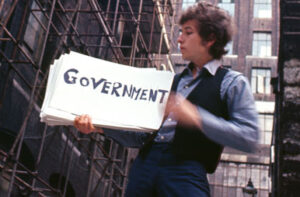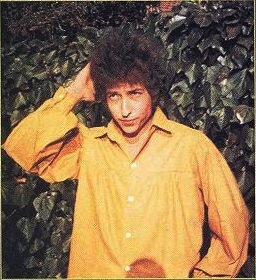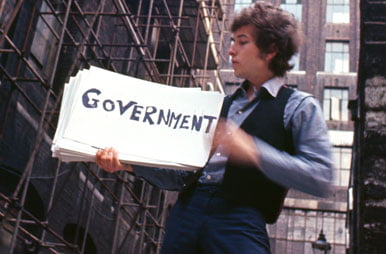SUBTERRANEAN HOMESICK BLUES: SOME EXTRACTSFULL TEXT HERE
Using the style and sense of comic disillusionment of Berry’s song as a springboard, Dylan updates the reasons for the protagonist’s complaints using short but extremely memorable phrases. Every word counts… Dylan delights in the use of ironically humorous rhymes. The song begins: …Johnny’s in the basement mixing up the medicine/ I’m on the pavement thinking about the government… With a nod and a wink, he encapsulates the lifestyle of what were then still known as ‘beatniks’ (the word ‘hippies’ had yet to be invented).
The first line clearly refers to some kind of drugs, while the narrator clearly has some kind of radical politics on his mind. ‘Johnny’ is the quintessential rock’n’roll name. Chuck Berry’s Johnny B. Goode, probably the most covered rock song ever, tells the story of a boy named Johnny who can …play the guitar like ringing a bell…. It has often been seen as a thinly veiled exposition of the story of Elvis Presley and thus of the creation of rock‘n’roll. ‘Johnny’ is the archetypal ‘cool kid’.

Subterranean lines…The lines that follow introduce apparently random elements of alliteration as the singer wraps his tongue around: …Try hard, get barred, get back, write braille
Get jailed, jump bail… It seems that whatever ‘the kid’ does will result in failure and frustration. The cynical resignation of …join the army if you fail… (another echo of Berry’s song) is a sly dig at the way that the military recruits rootless young men as ‘cannon fodder’. The narrator warns ‘the kid’ that he will also be used and exploited by those who, like him, live on the edge of the law: …losers, cheaters, six-time users… Dylan twists the colloquial expression ‘three time loser’ around here. We are told (rather hilariously) that these dubious characters are …hanging round the theaters…

At this point the narrator may be beginning to turn the venom of the song inwards. Perhaps he himself is ‘the kid’; beset by all kinds of chancers and weirdos who will try to ‘bend his mind’. And perhaps, in the deliriously silly lines that follow, he is warning himself about the dangers of ‘women on the make’ who also wish to exploit him: …Girl by the whirlpool, looking for a new fool…. The advice given to ‘the kid’ is to always stay true to himself …Don’t follow leaders… he is told.This is rhymed with the gloriously surreal …Watch the parking meters…as if the meters are somehow moving around, ‘keeping an eye’ on him. We may speculate that Dylan is denying the role of ‘leader’ of his generation.

Or he may be telling his followers to reject authority figures in general. Subterranean Homesick Blues is certainly an attack on the ideals of the ‘American Dream’, an ideology which suggests that any person can ‘make it’ to wealth and fame purely through hard work and application. One is reminded of Willy Loman’s reaction in Arthur Miller’s tragic deconstruction of the American Dream Death of a Salesman. When his wife points out that, after years of struggle, they have finally paid off their mortgage, Willy laments that now their children have grown up and moved out:
…Figure it out. Work a lifetime to pay off a house.
You finally own it, and there’s nobody to live in it…

Subterranean hits!
Subterranean Homesick Blueswas released as a single in March 1965, reaching no 39 in the USBillboard charts and the top ten in Britain. Since its release as the opening track on1965’s Bringing It All Back Homeit has appeared on numerous ‘Greatest Hits’ compilations. Yet the song has rarely been a staple of Dylan’s live shows. Apart from a brief revival in 2002, the majority of its live performances occurred in the early years of the Never Ending Tour. It was used as the set opener for all the 1988 shows and, rather less frequently, in the immediately succeeding years.

By opening with this iconic song, Dylan clearly signalled that the ethos of the early NET, with its small, tight band and shorter setlists, was very much a ‘return to basics’. However, although the performances were always lively and committed, the song does not seem to have been one which Dylan has been able to explore greatly in the live context. He never really captures the freewheeling insouciance of the recording.




Leave a Reply